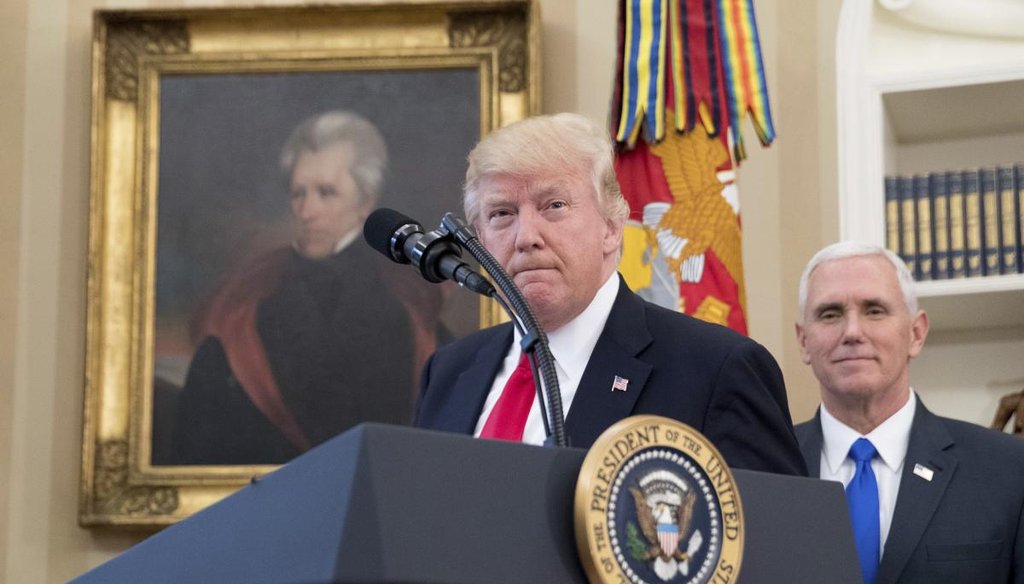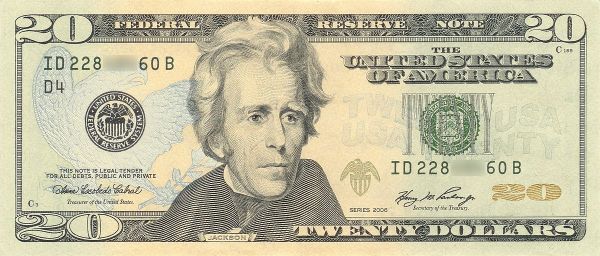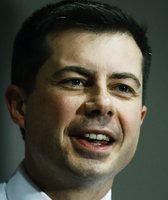Stand up for the facts!
Our only agenda is to publish the truth so you can be an informed participant in democracy.
We need your help.
I would like to contribute

In this March 31, 2017, file photo, a portrait of former President Andrew Jackson hangs on the wall behind President Donald Trump, accompanied by Vice President Mike Pence, in the Oval Office at the White House in Washington. (AP)
If it were possible to have a bromance across the centuries, Presidents Andrew Jackson and Donald Trump would almost certainly qualify.
Repeatedly over the past year, Trump has invoked and praised his predecessor in the White House, who served from 1829 to 1837. In addition to various mentions in remarks and on Twitter, Trump placed a portrait of Jackson in the Oval Office and made a pilgrimage to the late president’s tomb in Nashville less than two months after being sworn in.
"Trump is the first president to so openly admire and point to Jackson as a model, and to borrow so clearly and explicitly from the language of Jacksonian ‘democracy,’ " said J.M. Opal, a historian at McGill University and author of Avenging the People: Andrew Jackson, the Rule of Law, and the American Nation. "It has been more common for 20th century presidents to model themselves on recent leaders whom they personally knew."
For instance, Lyndon Johnson admired Franklin Roosevelt, and Bill Clinton made his childhood meeting with John F. Kennedy a touchstone of his career.
Trump’s affection for Jackson drew new attention on May 1, 2017, when, during an interview on Sirius XM’s P.O.T.U.S. channel, the president told the Washington Examiner's Salena Zito, "I mean, had Andrew Jackson been a little bit later you wouldn't have had the Civil War. He was a very tough person, but he had a big heart. He was really angry that he saw what was happening with regard to the Civil War, he said, 'There's no reason for this.' "
Almost immediately, critics took issue with Trump’s historical accuracy. The Washington Post’s Aaron Blake called Trump’s grasp of history "totally bizarre," noting, among other things, that Jackson died a decade and a half before the Civil War.
Trump responded with a tweet on the evening of May 1, writing, "President Andrew Jackson, who died 16 years before the Civil War started, saw it coming and was angry. Would never have let it happen!"
At times, Jackson was a popular figure and considered one of the nation’s greatest presidents.
For generations, many state and local Democratic parties held "Jefferson-Jackson dinners" to celebrate two of the biggest names in their party’s history, and some still do.
"Patrician historians of the late 19th century saw Jackson as ignorant and destructive, but praised him as a strong supporter of the Union," Harry L. Watson, a historian at the University of North Carolina-Chapel Hill and author of Liberty and Power: The Politics of Jacksonian America. "Progressives of the early 20th century saw him as a popular hero who fought special interests. New Dealers praised him as a strong president and a champion of working-class democracy."
But Trump’s seeming fondness for Jackson comes at something of a low reputational ebb -- a historical moment when many Americans have begun to focus on the darker side of Jackson’s record.
High on this list are his personal history as a slaveholder and his implementation, as president, of a policy of "Indian removal" from eastern lands that culminated in the "Trail of Tears," which led to the deaths of an estimated 5,000 Cherokees.
In recent years, "Jackson's offenses against Indians and blacks and his propensity for personal gun violence have overshadowed his economic policies among liberals and progressives," Watson said.
H. Lee Cheek, Jr., a historian at East Georgia State College who has written about early 19th century American history, said Trump has not paid enough attention to the more problematic sides of Jackson’s legacy.
"The Trump endorsement of Jackson follows from his very limited understanding of Jackson as a man of action," Cheek said. "He has no knowledge of the misdeeds of Jackson that are central to a complete understanding of his political career."
Emblematic of this modern-day discontent with Jackson is the move by Barack Obama’s Treasury Department in 2016 to take Jackson off the front of the $20 bill, making way for a portrait of abolitionist Harriet Tubman. (Jackson was to appear in a less conspicuous spot on the back of the bill.)
The move drew criticism from Trump, then a presidential candidate, who saw it as an example of political correctness.
"Well, Andrew Jackson had a great history, and I think it's very rough when you take somebody off the bill," he said on NBC’s Today show. "I think Harriet Tubman is fantastic, but I would love to leave Andrew Jackson or see if we can maybe come up with another denomination."
This wasn’t the first time Trump had cited Jackson. He did so in passing in a July 10, 2013, tweet.
Interesting…the last time a Democrat succeeded a two-term Democratic pres. was in 1836 when Martin Van Buren succeeded Andrew Jackson.
— Donald J. Trump (@realDonaldTrump) July 10, 2013
But the $20 bill redesign seemed to kick off a period in which Trump and his circle increasingly associated the candidate with the former president.
After Trump’s election, former New York City Mayor Rudy Giuliani, a Trump adviser, compared Trump favorably with Jackson. "This is like Andrew Jackson's victory," Giuliani said. "This is the people beating the establishment. And that's how he (Donald Trump) posited right from the beginning."
Another top Trump adviser, Steve Bannon, also compared Trump to Jackson on two occasions.
The New York Times’ Peter Baker offered a side-by-side comparison of the two presidents, including seemingly strong similarities in their "man of the people" stylings, their pugnaciousness and even their eccentric hairstyles.
"President Trump seems to like the tough-guy persona of Andrew Jackson," said H. W. Brands, a historian at the University of Texas-Austin and author of Andrew Jackson: His Life and Times. "There is no question that Jackson was decisive, and that he cared nothing for political propriety."
Some historians also see an intriguing shared dichotomy: Both Jackson and Trump professed to care about the ordinary man, and both came from great wealth. They each railed against political elites, but were less outspoken in their criticism against other types of rich and powerful Americans.
"Jackson had been a large import-export merchant, a lawyer and judge, and was as of the 1820s one of the largest slave-owners in central Tennessee, a man of immense power over the days and hours and even the lives of about 100 enslaved blacks, not to mention dozens of white debtors," Opal said. "Yet in his idea of ‘the people,’ he was an ordinary fella, a regular Joe. That is a strange kind of populism."
Still, several historians cautioned against going overboard in comparing Jackson and Trump.
For instance, Trump, a real estate developer, never served in the military and never served in elected office until he won the presidency. Jackson, by contrast, was a celebrated general, a member of both chambers of Congress, and a justice on the Tennessee Supreme Court.
"Jackson was a true egalitarian with a passion for democratic equality that you just don’t see in Trump," said David Greenberg, a presidential historian who teaches at Rutgers University.
Our Sources
Donald Trump, tweet, May 1, 2017
Donald Trump, tweet, March 15, 2017
Donald Trump, tweet, July 10, 2013
Edward-Isaac Dovere, tweet, May 1, 2017
History Channel, "Trail of Tears," accessed May 1, 2017
The Hill, "Trump hangs portrait of Andrew Jackson in Oval Office," Jan. 25, 2017
PRI, "Donald Trump compared to Andrew Jackson," Nov. 11, 2016
CNN, "Trump: Tubman on the $20 bill is 'pure political correctness,' " April 21, 2016
New York Times, "Trump Urges Supporters to Unite Behind G.O.P. Health Plan," March 15, 2017
New York Times, "Jackson and Trump: How Two Populist Presidents Compare," March 15, 2017
Washington Post, "Trump’s totally bizarre claim about avoiding the Civil War," May 1, 2017
Washington Post, "Bannon calls Trump’s speech ‘Jacksonian,' " Jan. 20, 2017
The Atlantic, "Donald Trump and the Legacy of Andrew Jackson," Nov. 30, 2016
Email interview with David Greenberg, historian at Rutgers University, May 1, 2017.
Email interview with Fergus M. Bordewich, author of America's Great Debate: Henry Clay, Stephen A. Douglas, and the Compromise That Preserved the Union, May 1, 2017
Email interview with J.M. Opal, historian at McGill University and author of Avenging the People: Andrew Jackson, the Rule of Law, and the American Nation, May 1, 2017
Email interview with Harry L. Watson, historian at the University of North Carolina-Chapel Hill and author of Liberty and Power: The Politics of Jacksonian America, May 1, 2017
Email interview with H. Lee Cheek, Jr., historian at East Georgia State College, May 1, 2017
Email interview with H. W. Brands, historian at the University of Texas-Austin and author of Andrew Jackson: His Life and Times, May 1, 2017






































